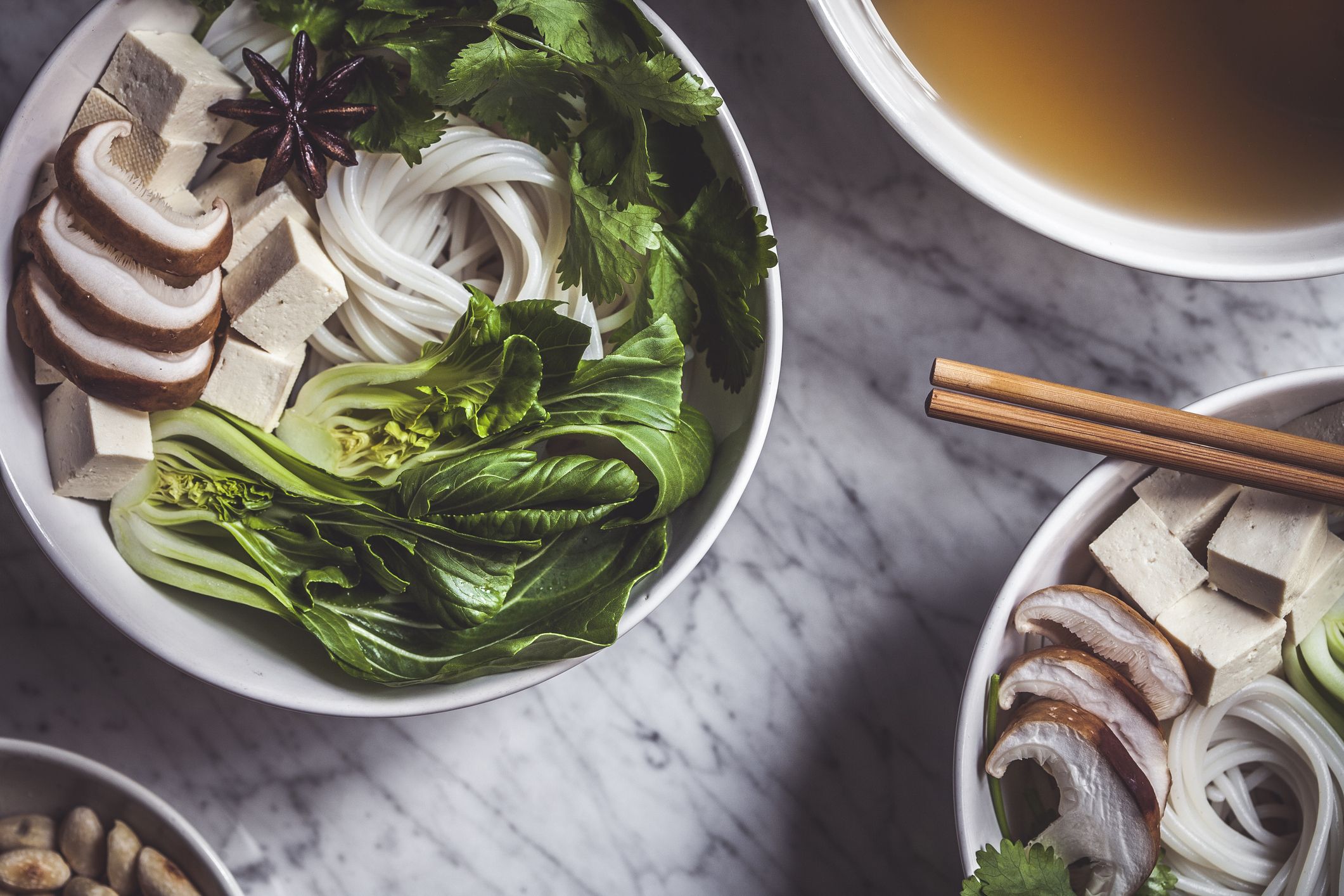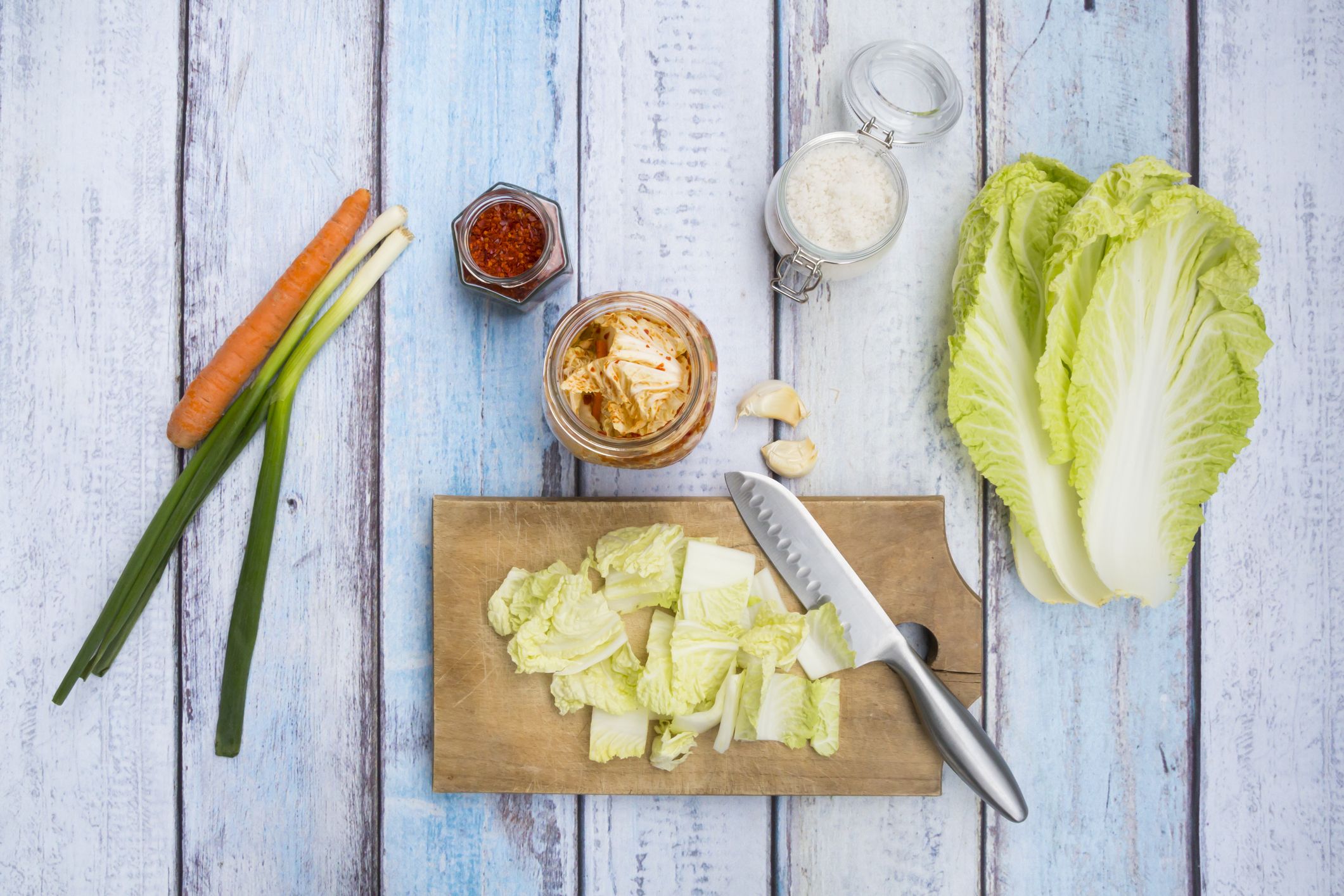Kimchi Is Basically Sauerkraut's Spicy Cousin And You Should Definitely Be Eating It
Love spicy food? (Yes!) Want a healthier gut? (Uh, sure? Why not!)
Well, if you’ve given the jars of kimchi popping up at the grocery store the side-eye, know this: The traditional Korean dish offers numerous health benefits, for your stomach and beyond.
Not sure what kimchi actually is? Made by fermenting cabbage, kimchi is sort of like the Asian version of sauerkraut, a longtime staple of German diets. However, while sauerkraut is typically made with white cabbage and spiced with caraway seeds, kimchi, on the other hand, uses Chinese cabbage and is spiced with garlic and chili paste, says Jessica Cording, RD, author of The Little Book of Game-Changers: 50 Healthy Habits For Managing Stress & Anxiety.
Despite their ingredient and flavor differences, both sauerkraut and kimchi have long been incorporated in traditional cooking—and for good reason. These fermented dishes are an easy, low-calorie way to up your vegetable intake and load up on health-boosting bacteria (a.k.a. probiotics).
Though kimchi has often been treated as a mere condiment, increased interest in all-things gut health (and the rising popularity of Korean cuisine—thanks, Momofuku!) is finally putting the spicy stuff front and center.
Kimchi serves up tons of health benefits.
Whether you already add kimchi to all of your salads or have never purchased a jar in your life, the stuff is darn good for you. Along with its spicy kick come a number of impressive health perks. Seriously, you might want to pick yourself up a jar (or two).
1. It’s good for your gut.
“Like other fermented veggies and foods, kimchi is rich in beneficial probiotics,” explains New York City-based dietitian Samantha Cassetty, RD. These healthy-for-you bacteria have been linked with many health benefits, all of which start in the digestive tract.

Eating kimchi can help improve the balance of good and bad bacteria in your gut, ultimately benefiting your gut health, adds Alissa Rumsey, RD, nutrition therapist and owner of Alissa Rumsey Nutrition and Wellness.
2. Kimchi might boost your immune health.
No shocker here: Kimchi’s digestive benefits carry over to your immune system, too. The probiotics in kimchi are “beneficial for immune function because the majority of immune function takes place in the gut,” says Cording. When your gut is in good shape, your immune system is better able to function optimally, she says.
3. It may help lower your cholesterol.
Though the exact link between kimchi and cholesterol isn’t totally clear, several studies have founds that people who eat kimchi regularly tend to have lower levels of “bad” (LDL) cholesterol. “Scientists aren’t sure which ingredients in kimchi, exactly, are responsible,” says Rumsey. (Cabbage, hot red peppers, garlic, leeks, ginger, and lactic acid bacteria—some of the common ingredients used in kimchi—all offer potential health benefits in their own rights.)
4. Kimchi can improve your heart health.
In addition to supporting healthy cholesterol, kimchi can also do your heart good by upping the levels of antioxidants in your body, says Cassetty. “Antioxidants help stabilize damaged cells that can accelerate the disease process, so having a high antioxidant status can protect you from chronic conditions, like heart disease,” she explains.
5. It may help with inflammation.
Excess or chronic inflammation takes a serious toll on your health over time, and probiotics (like you’ll find in kimchi) “can have an anti-inflammatory effect on the gut,” Cassetty says. In fact, one animal study published in the Journal of Microbiology found that a specific strain of probiotic found in kimchi reduced several markers for inflammation in the gut.
6. Kimchi can support brain health.
Another indirect result of a healthy gut: a better-working brain. “Keeping the digestive system healthy is also important for the brain, because the enteric nervous system in the gut communicates with your brain,” Cording says. This gut-brain connection requires a healthy gut to function properly.
7. Kimchi might even help with weight loss.
Okay, obviously eating kimchi won’t magically make you drop pounds. However, it can be a really helpful tool in your healthy lifestyle. “Kimchi is a flavorful, low-calorie option,” Cassetty says. People tend to overeat when their food is boring or bland but, “when you add flavorful elements like kimchi to meals, it’s easier to feel satisfied with a healthier portion size,” she explains.
Awesome! But are there any downsides to eating kimchi?
Unlike sauerkraut, traditional kimchi has some serious kick to it—and that can be an issue for some people. “If you’re sensitive to spice, either use just a little bit or look for versions with less heat,” Rumsey says.
Also worth noting: According to Cassetty, that spiciness can also trigger acid reflux in people who are prone to it.

Plus, some people may experience bloating after eating fermented foods—and considering kimchi is made with cabbage (another known bloat-inducer), it can spell trouble for people who get gassy easily, Cassetty points out.
Finally, just keep in mind that many kimchi products contain plenty of sodium, so keep your portions in check to keep from going overboard on the salt.
 Westend61Getty Images
Westend61Getty Images
Got it. So how do I make kimchi myself?
You can find kimchi in lots of local grocery stores these days (check the refrigerated section), but you can also make it at home if you prefer to DIY. Though every recipe is slightly different, kimchi is generally made with Chinese cabbage, salt, water, garlic, ginger, sugar, fish sauce, red pepper flakes, daikon radish, and scallions.
Basically, you chop up the cabbage, combine it with the other ingredients, seal it in a jar, and let it ferment at room temperature for a few days. From there, store it in the fridge.
Not sure where to start? Try this simple fermented kimchi recipe on for size.
How to eat ALL the kimchi, healthfully.
Lucky for your gut, kimchi is pretty versatile and can add a little heat to all sorts of savory dishes.
Cording recommends using kimchi as a topper on salads and vegetable dishes, and adding it into stir-fries. It also adds delicious flavor to soups, grain bowls, and eggs, Rumsey adds. Heck, you can even use it to punch up a burger.
Of course, you have full permission to also just eat it straight out of the jar when you’re craving a little spiciness…
Source: Read Full Article


